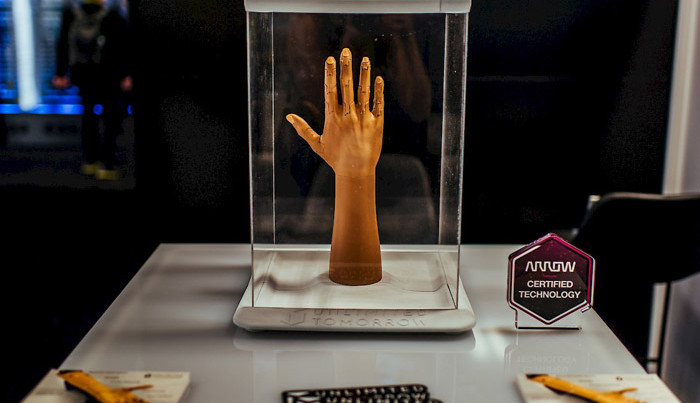3D-printed prosthetic arm cuts cost
February 18, 2019
on
on

A 3D scanning and printing process has been developed by the start up company Unlimited Tomorrow to produce cost-effective bespoke bionic arm prosthetics for amputees. Arrow Electronics are component partners for the company and were showcasing the prosthetic at the Consumer Electronics Show in Las Vegas recently.
Batteries in the prosthetics are charged wirelessly. An opposing natural limb is 3D scanned and mirrored to make the prosthetic as close a match as possible. Skin tone and other features such as freckling can also be applied to the surface and in-built haptic sensors provide pressure feedback.
Arrow is the electronics component supplier to Unlimited Tomorrow and is funding 15 prosthetics to support the company’s inspired ‘100 Tomorrows' campaign to manufacture and distribute 100 free robotic prosthetics to those in need. Unlimited Tomorrow is also part of Arrow’s Certification Program, which provides the start-up with an expert who guides the design to production and organizes resources as needed. Arrow’s input has informed prototype and board development as well as component selection.
Cutting costs
Conventional prosthetics are very expensive with prices starting at around $80,000. This represents a big financial hurdle for a family raising a young amputee because the prosthetic arm ideally needs to be replaced yearly as the child grows. Unlimited Tomorrow is developing a 3D printing and scanning process, which should ultimately reduce costs to around $5,000 per limb thereby making more frequent replacements affordable. Motors in the prosthetic arm move the fingers, controlled via Bluetooth from a 10-channel EEG headset. The control system is able to sense and adapt finger movements so that the system improves the longer it is worn. These learned control processes can be transferred when the prosthetic is replaced.Batteries in the prosthetics are charged wirelessly. An opposing natural limb is 3D scanned and mirrored to make the prosthetic as close a match as possible. Skin tone and other features such as freckling can also be applied to the surface and in-built haptic sensors provide pressure feedback.
Arrow is the electronics component supplier to Unlimited Tomorrow and is funding 15 prosthetics to support the company’s inspired ‘100 Tomorrows' campaign to manufacture and distribute 100 free robotic prosthetics to those in need. Unlimited Tomorrow is also part of Arrow’s Certification Program, which provides the start-up with an expert who guides the design to production and organizes resources as needed. Arrow’s input has informed prototype and board development as well as component selection.
Read full article
Hide full article



Discussion (0 comments)